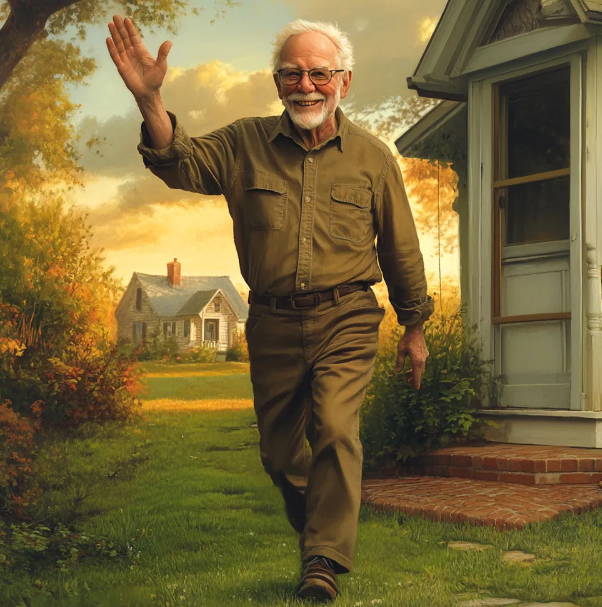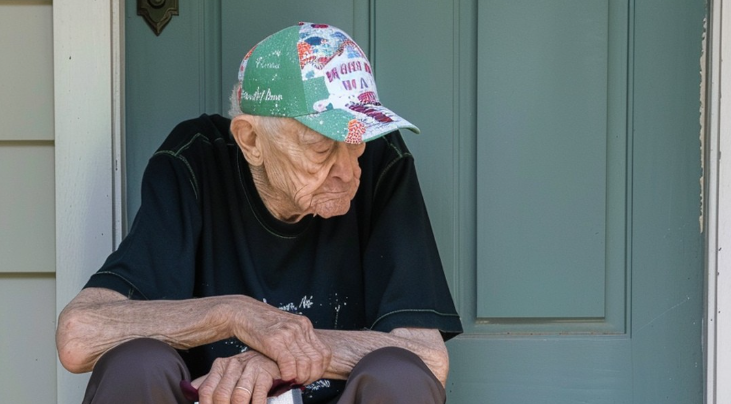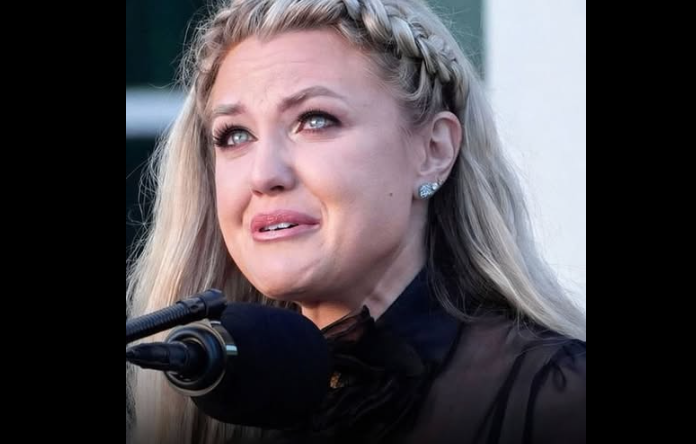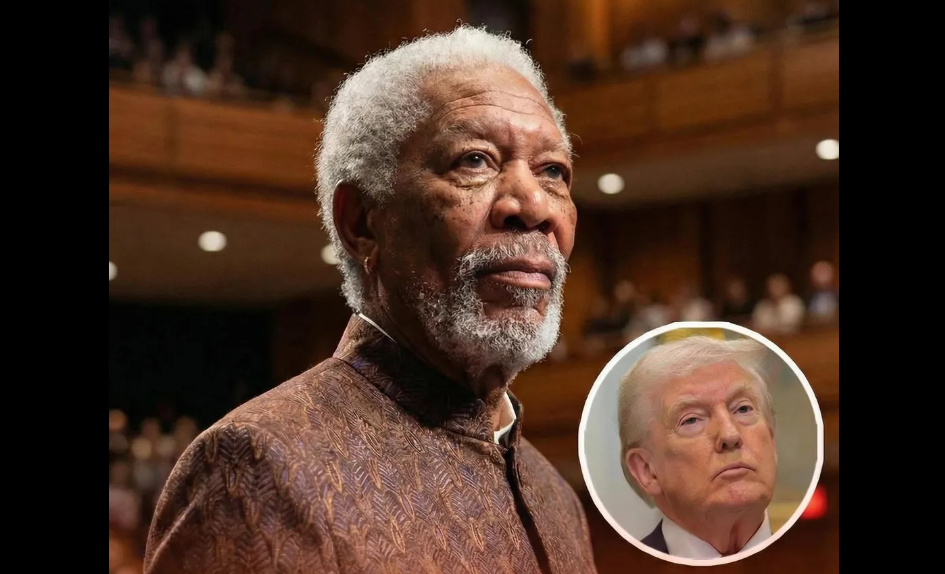Arnold’s 93rd birthday wish carried a heavy longing: to once more hear the sound of his children’s laughter echoing through his home. The table was set, the turkey perfectly roasted, and the candles flickered as he sat waiting. But the hours crawled by in silence until, at last, there was a knock at the door. It wasn’t who he had been waiting for.
The old cottage at the end of Maple Street bore the weight of years, much like its lone occupant. Arnold sat in his weathered armchair, the once-pristine leather cracked and faded. His tabby cat, Joe, purred softly in his lap, the only warmth in a room filled with shadows of the past. At 92, Arnold’s hands were unsteady, but they still found comfort in the rhythm of stroking Joe’s orange fur.
The afternoon sun filtered weakly through dusty windows, painting long shadows over faded photographs—remnants of a time when the house had been full of life.
“Do you know what today is, Joe?” Arnold’s voice cracked as he pulled an old photo album from the shelf. His hands trembled, not just from age but from the weight of memories. “It’s Tommy’s birthday. He’d be 42 today.”
He turned the pages slowly, each image a bittersweet dagger. “Look here. That toothless grin of his. Mariam made him that superhero cake he wanted so badly. I’ll never forget how his little face lit up!” His voice broke. “He hugged her so tightly that day, got frosting all over her dress. She didn’t even mind. Not when it came to making the kids happy.”
Five photographs lined the mantle, frozen moments of joy. Bobby, the daredevil with scraped knees and a mischievous grin. Jenny, clutching her beloved doll, Bella. Michael, beaming with pride as he held his first trophy. Sarah, resplendent in her graduation gown, tears mixing with spring rain. And Tommy, radiant on his wedding day, the spitting image of Arnold in his youth.
“The house remembers,” Arnold murmured, his hand brushing over the wall where pencil marks charted his children’s heights. His fingers paused on a line, the memories as vivid as if they’d happened yesterday. “Bobby’s baseball practice indoors,” he chuckled, voice thick with tears. “Mariam was so mad, but she couldn’t resist his puppy-dog eyes. ‘Mama,’ he’d say, ‘I’m practicing to be like Daddy.’ And she’d melt every time.”
Arnold shuffled into the kitchen, pausing before Mariam’s apron, still hanging on its hook. “Christmas mornings,” he whispered to the emptiness. “The kids thundering down the stairs, and you pretending not to hear them sneaking peeks at their gifts weeks before.”
Every Tuesday, Arnold sat on his porch swing, watching neighborhood children play. Their laughter stirred memories of days gone by when his own yard teemed with life. That afternoon, his neighbor Ben’s jubilant shout broke the reverie.
“Arnie! Both my kids are coming home for Christmas!” Ben’s face shone with excitement.
Arnold forced a smile, though his heart ached. “That’s wonderful, Ben.”

Ben continued, “Nancy’s bringing the twins, and Simon’s flying in from Seattle with his wife! Martha’s already planning the menu. Turkey, ham, and her famous apple pie—”
“It sounds perfect,” Arnold replied, swallowing the lump in his throat. “Mariam used to spend days baking. The whole house smelled like cinnamon and love.”
That evening, Arnold dialed his daughter Jenny’s number.
“Hi, Dad. What’s up?” Her voice was brisk, distant.
“Jenny, remember when you dressed as a princess for Halloween? You made me be the dragon, and you said a princess didn’t need a prince because she had her daddy—”
“Dad, I’m in a meeting. Can we talk later?” The dial tone cut him off.
One by one, Arnold called his children, each conversation a dagger to his heart. His youngest, Tommy, at least picked up.
“I miss you, son,” Arnold said softly. “Remember hiding under my desk during storms, saying, ‘Daddy, make the sky stop being angry’? I’d tell you stories until you fell asleep—”
“Dad, I really have to go,” Tommy interrupted. “Let’s catch up soon, okay?”
Arnold hung up, the silence deafening. “They used to fight over who got to talk to me first,” he whispered to Joe. “Now they avoid me altogether. When did I become a burden?”
Two weeks before Christmas, Arnold wrote letters to his children, pouring his heart into every word. Each envelope carried his plea: “Come home for Christmas.” The next morning, he braved the bitter wind to mail them, clutching the letters like lifelines.
At the post office, Paula, the clerk, smiled kindly. “Special delivery?”
“Letters to my kids,” Arnold said, his voice tinged with hope. “I want them home this Christmas.”
Back at his cottage, neighbors gathered to decorate. Ben hung lights while Martha baked cookies. “The kids need to see their grandpa’s house shine!” Mrs. Theo declared, directing with her cane.
Arnold watched from his doorway, overwhelmed. “You folks don’t have to do this.”
“Hush now,” Martha replied. “That’s what family does.”
On Christmas morning, Arnold waited by the window, the table set for five. But as the day wore on, only silence greeted him. By evening, he turned off the porch light, heart heavy with disappointment.
But then, a knock startled him. It wasn’t his children—it was a young neighbor, Brady, who asked to join Arnold for Christmas, sharing his own story of loss. Against all odds, Brady brought warmth back into Arnold’s home. Over time, the two formed an unlikely bond, reminding Arnold that love could come from unexpected places.
When Arnold passed peacefully in his chair months later, Brady ensured his memory lived on, carrying his walking stick on a trip to Paris—fulfilling a dream Arnold had long cherished. In his final act of kindness, Arnold’s spirit remained a beacon of love and connection, proving that even in the quietest corners of the world, hope never truly dies.






